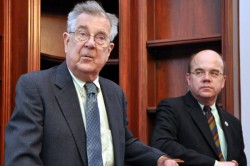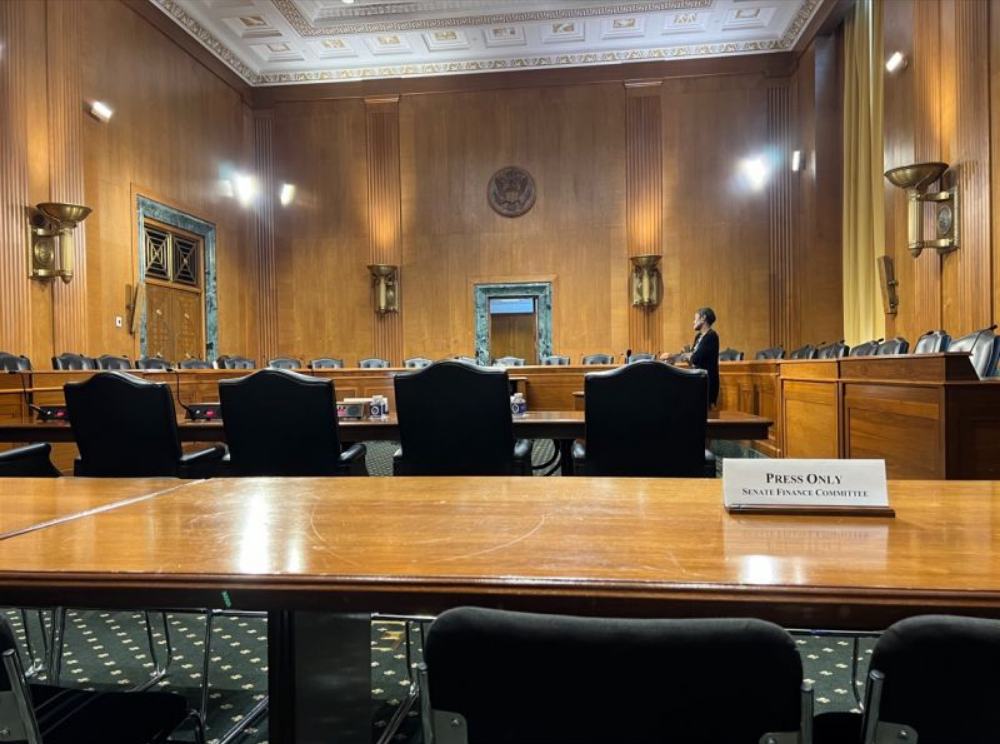National
Stark introduces adoption anti-discrimination bill
Calif. lawmaker wants Obama to endorse measure ‘wholeheartedly’


Reps. Pete Stark (left) and Jim McGovern on Tuesday introduced the Every Child Deserves a Family Act (Blade photo by Michael Key)
A U.S. House member from California on Tuesday introduced legislation that would bar discrimination against LGBT people in adoption cases while calling on President Obama to endorse the bill “wholeheartedly.”
During a news conference, Rep. Pete Stark (D-Calif.), the sponsor of the legislation, known as the Every Child Deserves a Family Act, said he wants the White House to support his bill fully in response to a question from the Washington Blade on what he’d like to see from the administration on the issue.
“I’d like to see the administration support our position more definitively,” Stark said. “I’ve had some troubles often determining where the administration is on issues, and I think it’s time that President Obama steps up to the bar and makes this — supports it wholeheartedly.”
Shin Inouye, a White House spokesperson, said in a statement that Obama believes that adoption rights should be afforded to all Americans and supports the goals of the legislation, but stopped short of offering an explicit endorsement of Stark’s bill. The lack of outright support is unlike the president’s position on other pro-LGBT initiatives, such as the Employment Non-Discrimination Act or “Don’t Ask, Don’t Tell” repeal.
“The president has long believed that we must ensure adoption rights for all couples and individuals, regardless of their sexual orientation,” Inouye said. “He recognizes that adoptive families come in many forms, and that we must do all we can to break down barriers to ensure that all qualified caregivers have the ability to serve as adoptive families. While we have not reviewed this specific legislation, we share its goals to expand adoption rights and move the dialogue forward on this issue.”
The Every Child Deserves a Family Act, which has 33 original co-sponsors, would restrict federal funds for states that allow discrimination in adoption or foster care placement based on the sexual orientation, marital status or gender identity of potential parents — as well as LGBT children seeking homes. Sen. Kirsten Gillibrand (D-N.Y.) is expected to introduce companion legislation in June in the Senate.
Some states recently have taken steps to inhibit potential LGBT parents from adopting. Last month, Arizona Gov. Jan Brewer (R) signed legislation that would give primary consideration in adoptive placement to opposite-sex married couples. Additionally, Virginia’s State Board of Social Services recently rejected adding protections against discrimination in adoption cases on the basis of sexual orientation as well as other statuses.
At the news conference, Stark billed the legislation as a means to ensure children living in the foster care system have access to a greater number of adoptive families — including households with single parents or same-sex parents.
“What’s in the child’s best interest is what the bill is trying to promote,” Stark said. “There is no information that shows that children raised by a single parent or gay or lesbian parent households have any more or less problems than all other children.”
According to Stark’s office, the U.S. government spends more than $7 billion each year on a foster care system against potential single and LGBT parents and allows around 25,000 children age out annually. More than 500,000 children are in foster care and 120,000 of them available for adoption.
Rep. Jim McGovern (D-Mass.), an original co-sponsor for the bill, said the Every Child Deserves a Family Act is necessary to eliminate discrimination against potential LGBT parents and to iron out the differences in adoption policy throughout the country.
“Automatically disqualifying LGBT parents from adoption just because of sexual orientation is wrong,” McGovern said. “It makes no sense, especially when so many children are in foster care waiting to be adopted. The current patchwork of unfair state laws and policies … is denying multiple kids to permanent safe and stable homes.”
The issue of LGBT adoption has already emerged as an issue for a Republican who could be considering a run in the 2012 presidential campaign. According to Think Progress, former U.S. Sen. Rick Santorum, who’s widely expected to be eyeing a White House bid, said in a speech Monday before the FAMiLY Leader in Iowa that adoption is a “privilege” to which LGBT people aren’t entitled.
“A lesbian woman walked up to me and said, ‘Why are you denying me my right?’” Santorum said. “I said, ‘Well, because it’s not a right.’ It’s a privilege. It’s a privilege that society recognizes because society sees intrinsic value to that relationship over any other relationship.”
During the news conference, Stark blasted Santorum for his anti-gay comments and said the former senator’s opinion is no longer relevant because he was voted out in 2006.
“Rick who?” Stark said. “There was a guy in Congress years ago named Santorum, but I think he left. He lost, but [has been] following that path ever since. I think that’s nonsense.”
Organizations that work on LGBT advocacy and child welfare — including the Family Equality Council and Parents, Families & Friends of Lesbians & Gays — praised Stark for introducing the legislation as means to end discrimination and allow more children to find homes.
Linda Spears, vice president of policy and public affairs for the Child Welfare League of America, said passage of the Every Child Deserves a Family Act would help ensure children who are waiting in foster care can find homes.
“We must recognize that statutory frameworks are absolutely essential in order to get this job done,” Spears said. “We cannot have policies in which kids are systemically disadvantaged by state law and by state policy. We cannot have policies that disadvantage and allow children to linger in foster care, those who categorically exclude certain families and put other kids in legal limbo because second parents are not allowed to adopt.”
Jennifer Chrisler, executive director of the Family Equality Council, similarly said the legislation is needed to counter what she called “despicable” attempts at the state level aimed at impairing the right to adopt for LGBT people.
“These efforts are divisive, there are despicable, and they push a political agenda at the expense who some of those children who are most vulnerable — the thousands of kids who are living in foster care, [excluding them] from loving, permanent homes,” Chrisler said.
Amy Coleman, a Massachusetts foster care alum who was adopted at age 16 by lesbian parents, pressed for legislation allowing full adoption rights for LGBT families by recalling the story of her own adoption.
“My moms have been loving, wonderful parents and will continue to be loving, wonderful parents,” Coleman said. “I just felt it was important to come down and share that so that other foster kids know that there are homes out there for them that might not be traditional, but are definitely wanting to take them in, so they don’t have to spend their rest of their time in foster care wondering if there is someone who can, or will, adopt them.”
Moving the legislation will be challenging in the Republican-controlled House, where the bill will likely be assigned to the House Ways & Means Committee. The office of the committee chair, Rep. Dave Camp (R-Mich.), didn’t respond on short notice to the Blade’s request to comment on the measure.
Stark said he hasn’t spoken with Camp about the Every Child Deserves a Family Act, but added the adoption issue could come before the House Ways & Means Committee in some capacity.
“I suppose that we’ll have a hearing on this at some point — one way or the other,” Stark said. “The press will require it or the Republicans will in opposition to it. The hearings may not be favorable, but there may very well be hearings on it.”
As of Tuesday, the legislation had no Republican co-sponsors, although Stark suggested that the bill may gain GOP support because he’s spoken to a Republican lawmaker who has indicated interest. Stark didn’t identify the U.S. House member.
The list of original co-sponsors for the legislation notably lacks the names of Democratic lawmakers who usually sign on to pro-LGBT legislation — including House Minority Leader Nancy Pelosi (D-Calif.) as well as gay Reps. Barney Frank (D-Mass.) and David Cicilline (D-R.I.).
Drew Hammill, a Pelosi spokesperson, said the Democratic leader will sign on as co-sponsor.
Harry Gural, a Frank spokesperson, said his boss wasn’t asked to support the Every Child Deserves a Family Act.
“Congressman Frank considers co-sponsoring a bill when he is asked by the member introducing the bill, when one of that member’s staff makes a request via our staff, or when he gets a request from a constituent,” Gural said. “In this case, none of those took place.”
Jessica Kershaw, a Cicilline spokesperson, said the legislation is on her boss’ radar and he’s reviewing it.
Despite the lack of outright support from the White House, one LGBT rights organization maintained the Obama administration is already working to address adoption discrimination through administrative means.
Fred Sainz, the Human Rights Campaign’s vice president of communications, said the Department of Health & Human Services is “doing a substantial amount of work” as part of HRC’s “All Children All Families” initiative, an agency by agency approach to preventing LGBT discrimination in adoption cases, which aims for the same results as Stark’s legislation.
“At the same time, HRC is working with the HHS to provide greater incentives to states, tribes and territories which receive federal funds to establish more inclusive practices,” Sainz said. “The Informational Memorandum on LGBT youth and families which went out two weeks ago, and was largely a result of our advocacy, is a good example of that ongoing work.”
Sainz was referring to an April 6 memo from HHS encouraging child welfare agencies to serve better the needs of LGBT youth in the foster care system. The memo states agencies should avail themselves of federal funds for training staff on serving LGBT children and called LGBT potential parents an untapped resource for providing homes for LGBT youth.
Indiana
Drag queen announces run for mayor of Ind. city
Branden Blaettne seeking Fort Wayne’s top office

In a Facebook post Tuesday, a local drag personality announced he was running for the office of mayor once held by the late Fort Wayne Mayor Tom Henry, who died last month just a few months into his fifth term.
Henry was recently diagnosed with late-stage stomach cancer and experienced an emergency that landed him in hospice care. He died shortly after.
WPTA, a local television station, reported that Fort Wayne resident Branden Blaettne, whose drag name is Della Licious, confirmed he filed paperwork to be one of the candidates seeking to finish out the fifth term of the late mayor.
Blaettner, who is a community organizer, told WPTA he doesn’t want to “get Fort Wayne back on track,” but rather keep the momentum started by Henry going while giving a platform to the disenfranchised groups in the community. Blaettner said he doesn’t think his local fame as a drag queen will hold him back.
“It’s easy to have a platform when you wear platform heels,” Blaettner told WPTA. “The status quo has left a lot of people out in the cold — both figuratively and literally,” Blaettner added.

The Indiana Capital Chronicle reported that state Rep. Phil GiaQuinta, who has led the Indiana House Democratic caucus since 2018, has added his name to a growing list of Fort Wayne politicos who want to be the city’s next mayor. A caucus of precinct committee persons will choose the new mayor.
According to the Fort Wayne Journal Gazette, the deadline for residents to file candidacy was 10:30 a.m. on Wednesday. A town hall with the candidates is scheduled for 6 p.m. on Thursday at Franklin School Park. The caucus is set for 10:30 a.m. on April 20 at the Lincoln Financial Event Center at Parkview Field.
At least six candidates so far have announced they will run in the caucus. They include Branden Blaettne, GiaQuinta, City Councilwoman Michelle Chambers, City Councilwoman Sharon Tucker, former city- and county-council candidate Palermo Galindo, and 2023 Democratic primary mayoral candidate Jorge Fernandez.
Arizona
Ariz. governor vetoes anti-transgender, Ten Commandments bill
Katie Hobbs has pledged to reject anti-LGBTQ bills that reach her desk

BY CAITLIN SIEVERS | A slew of Republican bills, including those that would have allowed discrimination against transgender people and would have given public school teachers a green light to post the Ten Commandments in their classrooms, were vetoed by Gov. Katie Hobbs on Tuesday.
Hobbs, who has made it clear that she’ll use her veto power on any bills that don’t have bipartisan support — and especially ones that discriminate against the LGBTQ community — vetoed 13 bills, bringing her count for this year to 42.
Republicans responded with obvious outrage to Hobbs’s veto of their “Arizona Women’s Bill of Rights,” which would have eliminated any mention of gender in state law, replacing it with a strict and inflexible definition of biological sex. The bill would have called for the separation of sports teams, locker rooms, bathrooms, and even domestic violence shelters and sexual assault crisis centers by biological sex, not gender identity, green-lighting discrimination against trans Arizonans.
“As I have said time and again, I will not sign legislation that attacks Arizonans,” Hobbs wrote in a brief letter explaining why she vetoed Senate Bill 1628.
The Arizona Senate Republicans’ response to the veto was filled with discriminatory language about trans people and accused them of merely pretending to be a gender different than they were assigned at birth.
“With the radical Left attempting to force upon society the notion that science doesn’t matter, and biological males can be considered females if they ‘feel’ like they are, Katie Hobbs and Democrats at the Arizona State Legislature are showing their irresponsible disregard for the safety and well-being of women and girls in our state by killing the Arizona Women’s Bill of Rights,” Senate Republicans wrote in a statement.
The Senate Republicans went on to accuse the Democrats who voted against the bill of endangering women.
“Instead of helping these confused boys and men, Democrats are only fueling the dysfunction by pretending biological sex doesn’t matter,” Senate President Warren Petersen said in the statement. “Our daughters, granddaughters, nieces, and neighbors are growing up in a dangerous time where they are living with an increased risk of being victimized in public bathrooms, showers, and locker rooms because Democrats are now welcoming biological males into what used to be traditionally safe, single-sex spaces.”
But trans advocates say, and at least one study has found, that there’s no evidence allowing trans people to use the bathroom that aligns with their identity makes those spaces less safe for everyone else who uses them.
In the statement, the bill’s sponsor, Sen. Sine Kerr (R-Buckeye), claimed that the bill would have stopped trans girls from competing in girls sports, something she said gives them an unfair advantage. But Republicans already passed a law to do just that in 2022, when Republican Gov. Doug Ducey was still in office, though that law is not currently being enforced amidst a court challenge filed by two trans athletes.
Republicans also clapped back at Hobbs’ veto of Senate Bill 1151, which would have allowed teachers or administrators to teach or post the Ten Commandments in public school classrooms, a measure that some Republicans even questioned as possibly unconstitutional.
In a statement, the bill’s sponsor, Sen. Anthony Kern (R-Glendale), accused Hobbs of “abandoning God” with her veto.
“As society increasingly strays away from God and the moral principles our nation was founded upon, Katie Hobbs is contributing to the cultural degradation within Arizona by vetoing legislation today that would have allowed public schools to include the Ten Commandments in classrooms,” Kern said in the statement.
In her veto letter, Hobbs said she questioned the constitutionality of the bill, and also called it unnecessary. During discussion of the bill in March, several critics pointed out that posting the Ten Commandments in public school classrooms, tenets of Judeo-Christian religions, might make children whose families practice other religions feel uncomfortable.
“Sadly, Katie Hobbs’ veto is a prime example of Democrats’ efforts to push state-sponsored atheism while robbing Arizona’s children of the opportunity to flourish with a healthy moral compass,” Kern said.
Another Republican proposal on Hobbs’s veto list was Senate Bill 1097, which would have made school board candidates declare a party affiliation. School board races in Arizona are currently nonpartisan.
“This bill will further the politicization and polarization of Arizona’s school district governing boards whose focus should remain on making the best decisions for students,” Hobbs wrote in her veto letter. “Partisan politics do not belong in Arizona’s schools.”
******************************************************************************************

Caitlin joined the Arizona Mirror in 2022 with almost 10 years of experience as a reporter and editor, holding local government leaders accountable from newsrooms across the West and Midwest. She’s won statewide awards in Nebraska, Indiana and Wisconsin for reporting, photography and commentary.
******************************************************************************************
The preceding piece was previously published by the Arizona Mirror and is republished with permission.
Amplifying the voices of Arizonans whose stories are unheard; shining a light on the relationships between people, power and policy; and holding public officials to account.
Arizona Mirror is part of States Newsroom, the nation’s largest state-focused nonprofit news organization.
National
Senate committee: Republican attorneys general abused power demanding trans medical records
AGs used ‘abusive legal demands’

In a 10-page report released on Tuesday by staff for the Democratic majority of the U.S. Senate Finance Committee, the Republican attorneys general of Tennessee, Missouri, Indiana, and Texas are accused of using “abusive legal demands” to collect the medical records of transgender patients in furtherance of the attorneys general’ “ideological and political goals.”
According to the document, which is titled “How State Attorneys General Target
Transgender Youth and Adults by Weaponizing the Medicaid Program and their Health Oversight Authority,” the attorneys general used specious or misleading legal pretexts to justify their issuance of civil investigative demands to healthcare providers.
For example, the office of Tennessee Attorney General Jonathan Skrmetti framed the request as part of a probe into the potential misuse of Medicaid funds, while the offices of Indiana Attorney General Todd Rokita and Missouri Attorney General Andrew Bailey cited suspected violations of consumer protection laws. The office of Texas Attorney General Ken Paxton, which demanded records from “at least two hospitals located in Texas as well as at least two medical providers” in Washington and Georgia, did not disclose why the requests were issued.
The report found that information requested by the attorneys general’s offices included “invasive items such as unredacted physical and mental health records, photographs of children’s bodies, correspondence to hospitals’ general email addresses for LGBTQIA+ patients, and lists of people referred for transgender health care.”
In response, and in what the committee called “a grave violation of patient privacy and trust,” some providers turned over “near-complete, patient-identifiable” information while others used legal processes available to them such as privacy protections in the Health Insurance Portability and Accountability Act to share fewer details with the attorneys general’s offices.
The report noted that Vanderbilt University Medical Center in Nashville had “failed to object in any material manner to the Tennessee attorney general’s sweeping request and then caused undue terror to young patients and their families by supplying the Tennessee attorney general with some of the records requested and then, again, by erroneously notifying some patients of medical record disclosures that had not occurred.”
News concerning Vanderbilt’s receipt of and compliance with the demands from Skrmetti’s office was made public in June, sparking widespread concern and panic among many of the center’s trans patients and their families. Some, according to the report, experienced suicidal ideation and emotional distress including depression and anxiety.
A plaintiffs’ lawsuit was filed in July over VUMC’s failure to redact personally identifying information from the medical records. The following month, the center disclosed plans to comply with an investigation by the U.S. Department of Health and Human Services Office of Civil Rights.
In a statement to NBC News, Michael Regier, the medical center’s general counsel and secretary, said the hospital disputes the findings published in the committee’s report and had submitted “a detailed letter outlining our concerns about its proposed findings before it was released.”
“We made every effort to both protect our patients and follow the law,” Regier said, adding that “At no point did we violate privacy laws, and we strongly disagree with any suggestion that we did.”
However, the committee’s report notes that by contrast, providers in other states like the Washington University School of Medicine in St. Louis refused to turn over patient records, citing privacy concerns and HIPPA regulations. And after staff for U.S. Sen. Ron Wyden (D-Ore.), the committee chair, had requested and reviewed copies of correspondence between VUMC and the Tennessee attorney general’s office, they concluded that the documentation “sheds light, for the first time, on the full extent of VUMC’s acute and repeated failures to protect its patients.”
For example, the report explains that after Skrmetti’s office issued the initial request to VUMC, it followed up with two additional civil investigative demands for “confidential information across 18 categories without any bounds on the number of patients or people implicated” ranging from “employment contracts for physicians to volunteer agreements for the
VUMC Trans Buddy Program to communications to and from a general email address.”
In response, the hospital shared “65,000 pages of documents, including the medical records of 82 transgender patients.” The information that was provided pursuant to receipt of Skrmetti’s office’s third civil investigative demand is unknown.






















